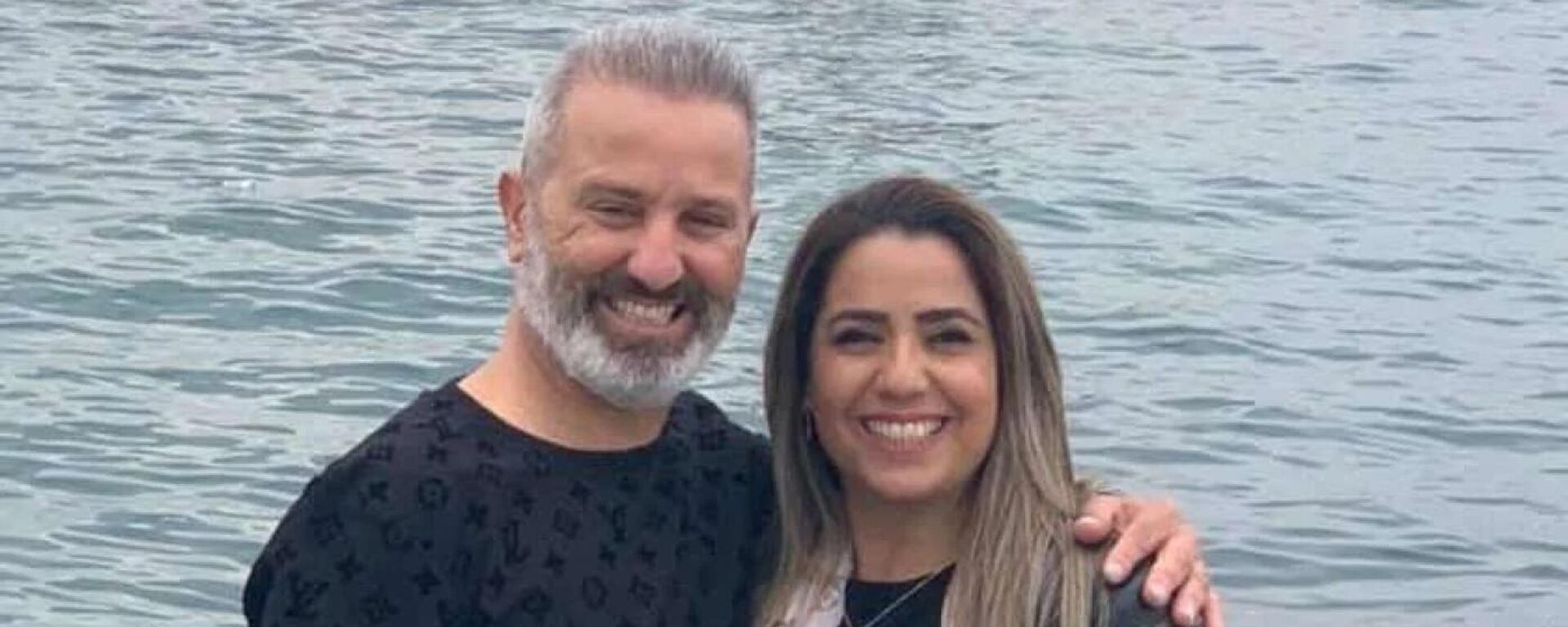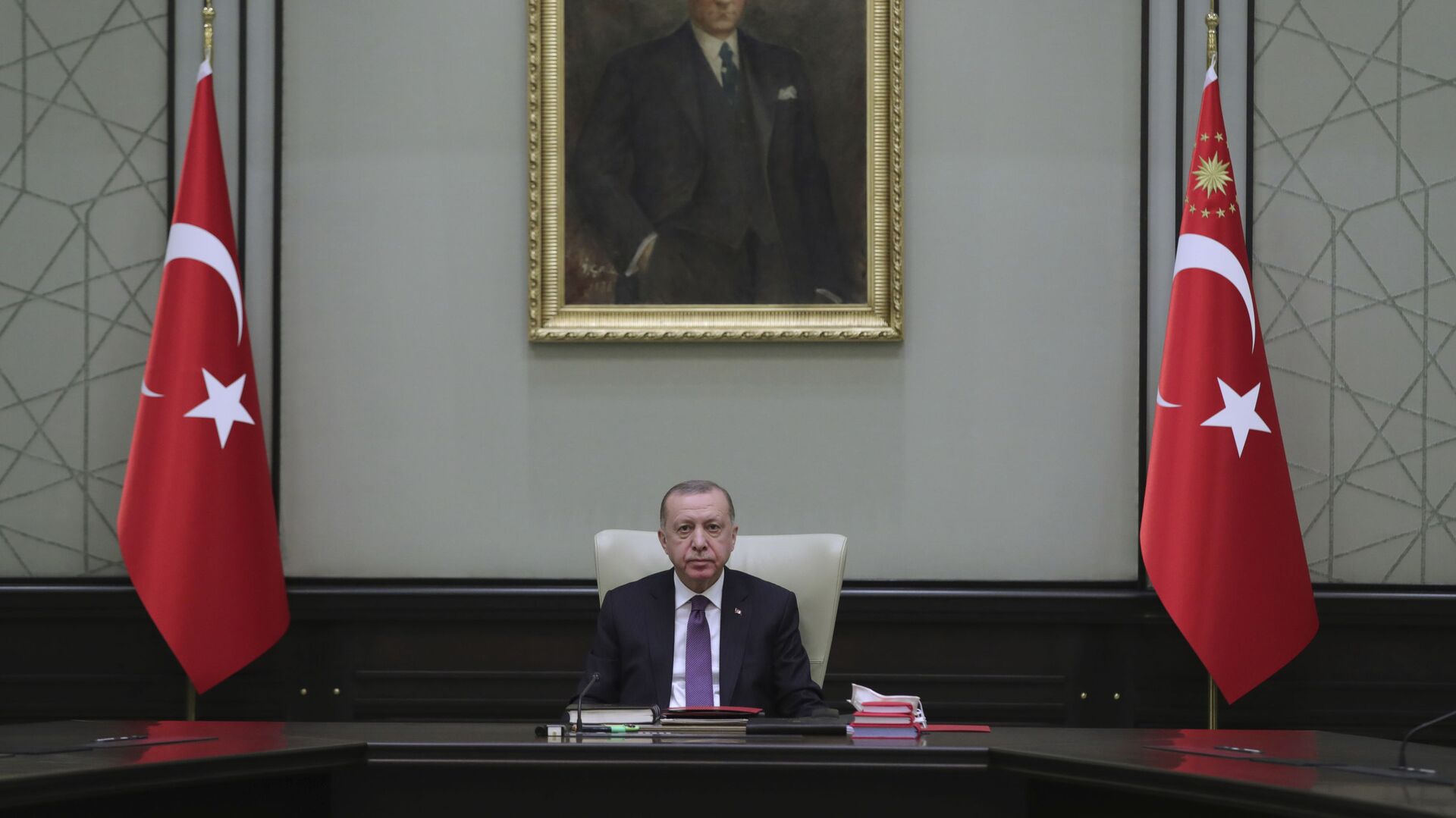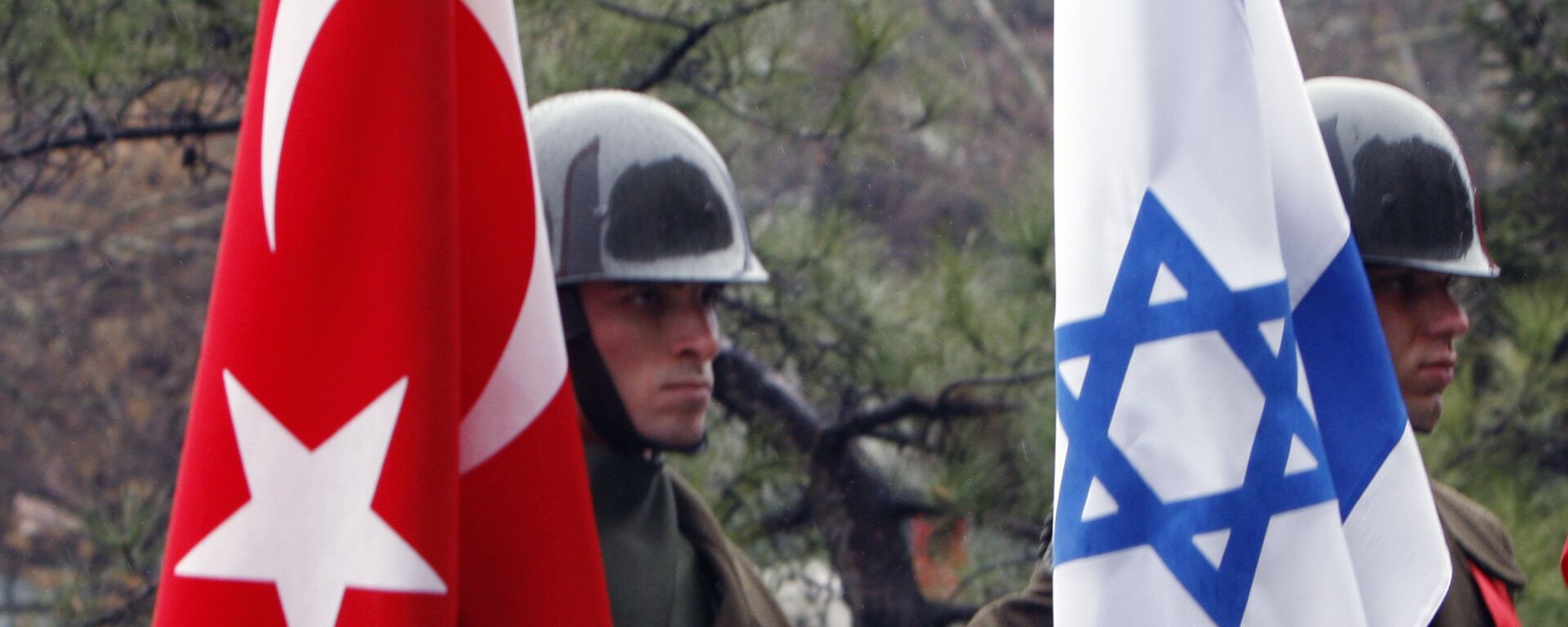https://sputnikglobe.com/20211216/turkey-wants-to-repair-ties-with-neighbours-but-whats-behind-this-rapprochement-1091569331.html
Turkey Wants to Repair Ties With Neighbours, But What's Behind This Rapprochement?
Turkey Wants to Repair Ties With Neighbours, But What's Behind This Rapprochement?
Sputnik International
Although Turkey's official policy has been "zero problems" with regional players, the country has lost the support of several nations for various reasons. But... 16.12.2021, Sputnik International
2021-12-16T09:00+0000
2021-12-16T09:00+0000
2023-01-15T17:25+0000
middle east
turkiye
relations
uae
israel
https://cdn1.img.sputnikglobe.com/img/07e5/05/09/1082841587_0:345:3026:2047_1920x0_80_0_0_f111d12874910ce525de6fada4001ee7.jpg
Turkey's President Recep Tayyip Erdogan is expected to visit the United Arab Emirates in February, local media reported.The move comes as Ankara is trying to repair its ties with the UAE, following a number of spats that included Turkey’s alleged support for the Muslim Brotherhood, a movement outlawed in the Emirates, and Abu Dhabi's decision to normalise relations with Israel in September last year.Souring RelationsAlon Liel, Israel's former ambassador to Turkey, says Ankara’s attempts to mend ties with neighbours is not accidental.Although for years, the official foreign policy of Turkey has been that of "zero problems with neighbours", in reality Ankara's ties with regional players have gradually soured.Neighbouring Syria has accused it of supporting rebels and extremists, allegations that Ankara has repeatedly denied, claiming that it only defended itself from the threat of the Syrian Kurdish fighters, which it views as terrorists.Egypt accuses Turkey of harbouring members of the Muslim Brotherhood, involvement in the Libyan civil war, and attempting to establish control of the North African country's oil resources. Ankara has repeatedly denied these allegations, saying its oil exploration in the Eastern Mediterranean was legal and fell under a 2019 deal it reached with Libya's internationally-recognised Government of National Accord.Turkey was also accused of meddling in the internal affairs of Israel by backing Hamas, an offshoot of the Muslim Brotherhood considered a terrorist organisation by many regional and international players."At some point, Erdogan had realised that [while he was fighting with everyone], Egypt had become a strategic ally of Israel. Meanwhile, the latter improved its regional and international standing. It is now stronger economically and technologically, whereas on the diplomatic front it also enjoys stable relations with neighbours," explained Liel.After the signing of the Abraham Accords that normalised relations between Israel, the UAE and Bahrain, the international standing of Israel has dramatically improved. The trade between Tel Aviv and Abu Dhabi has topped half a billion dollars, and other Muslim states of the region have started getting closer to Israeli officials.Rapprochement with IsraelTurkey, says Liel, is now striving to become one of them. In November, Turkish authorities released an Israeli couple that was arrested earlier that month on charges of espionage. The move was interpreted by Israeli media as Ankara's attempt to mend ties with the current government."The previous government under former Prime Minister Benjamin Netanyahu had personal grievances with Erdogan," said Liel, referring to the Mavi Marmara incident of 2010, where ten Turkish nationals lost their lives after a violent confrontation with the IDF.Relations between Israel and Turkey started souring in 2008, with Tel Aviv launching Cast Lead, a military operation in the Gaza Strip. During the three weeks of fighting, the IDF killed more than a thousand Palestinians. It also destroyed the area's roads, hospitals, schools and residential buildings, something that Ankara could not forgive.The Mavi Marmara incident was the final nail in the coffin. Since then those ties have only gotten worse. Turkey has accused Israel of persecuting and murdering the Palestinians. In 2018, Ankara even recalled the Turkish ambassador to Israel in protest against the IDF crackdown on rioters that took to the fence that separates Gaza from Israel.Israel didn't bite its tongue either. Officials have repeatedly accused Turkey of supporting Hamas, and that mistrust has even led them to divert the country's ambitious gas project through Cyprus and Greece and then to Europe, to avoid relying on Ankara and the good will of its leadership.President Erdogan has reportedly taken several steps in order to mend relations with Israel.A year ago, Turkey named an ambassador to Israel and more recently Erdogan said he was willing to improve ties with Tel Aviv, if it showed more empathy towards the Palestinians.But Liel says Erdogan is not in a position to dictate his rules."First of all, Israel has enough international backing [not to bend under pressure - ed.] Secondly, the Palestinian issue does not top Arab countries' agenda anymore, especially after the Abraham Accords. And, lastly, I am sure that there are other, more burning issues that concern the Turks, like the gas deal and the exchange of ambassadors," reasoned the former diplomat."Right now, Israel feels that it doesn't need Turkey because we have Cyprus, Greece, the UAE and others. But we shouldn't erase this country and we should mend relations to prepare ourselves for the day after Erdogan," he summed up.
https://sputnikglobe.com/20210725/set-for-reset-are-israel-turkey-relations-back-on-track-1083457290.html
https://sputnikglobe.com/20211118/israeli-couple-arrested-for-suspected-espionage-over-photo-of-erdogans-palace--returns-home--1090823597.html
turkiye
uae
israel
Sputnik International
feedback@sputniknews.com
+74956456601
MIA „Rosiya Segodnya“
2021
News
en_EN
Sputnik International
feedback@sputniknews.com
+74956456601
MIA „Rosiya Segodnya“
Sputnik International
feedback@sputniknews.com
+74956456601
MIA „Rosiya Segodnya“
president erdogan, turkish president, turkey-israel relations, turkey-uae ties
president erdogan, turkish president, turkey-israel relations, turkey-uae ties
Turkey Wants to Repair Ties With Neighbours, But What's Behind This Rapprochement?
09:00 GMT 16.12.2021 (Updated: 17:25 GMT 15.01.2023) Although Turkey's official policy has been "zero problems" with regional players, the country has lost the support of several nations for various reasons. But now Ankara seems to be determined to change the situation.
Turkey's President Recep Tayyip Erdogan is expected to visit the United Arab Emirates in February, local
media reported.
The move comes as Ankara is trying to repair its ties with the UAE, following a number of spats that included Turkey’s alleged support for the Muslim Brotherhood, a movement outlawed in the Emirates, and Abu Dhabi's decision to normalise relations with Israel in September last year.
Alon Liel, Israel's former ambassador to Turkey, says Ankara’s attempts to mend ties with neighbours is not accidental.
"Erdogan has had quarrels with the Americans and the Europeans," said the expert. "He's also found himself isolated in the region. And that made him understand that he needed to change the direction to improve his positions."
Although for years, the official foreign policy of Turkey has been that of "zero problems with neighbours", in reality Ankara's ties with regional players have gradually soured.
Neighbouring Syria has accused it of supporting rebels and extremists, allegations that Ankara has repeatedly denied, claiming that it only defended itself from the threat of the Syrian Kurdish fighters, which it views as terrorists.
Egypt accuses Turkey of harbouring members of the Muslim Brotherhood, involvement in the Libyan civil war, and attempting to establish control of the North African country's oil resources. Ankara has repeatedly denied these allegations, saying its oil exploration in the Eastern Mediterranean was legal and fell under a 2019 deal it reached with Libya's internationally-recognised Government of National Accord.
Turkey was also accused of meddling in the internal affairs of Israel by backing Hamas, an offshoot of the Muslim Brotherhood considered a terrorist organisation by many regional and international players.
"At some point, Erdogan had realised that [while he was fighting with everyone], Egypt had become a strategic ally of Israel. Meanwhile, the latter improved its regional and international standing. It is now stronger economically and technologically, whereas on the diplomatic front it also enjoys stable relations with neighbours," explained Liel.
After the signing of the Abraham Accords that normalised relations between Israel, the UAE and Bahrain, the international standing of Israel has dramatically improved. The trade between Tel Aviv and Abu Dhabi has topped half a billion dollars, and other Muslim states of the region have started getting closer to Israeli officials.
Rapprochement with Israel
Turkey, says Liel, is now striving to become one of them. In November, Turkish authorities released an Israeli couple that was arrested earlier that month on charges of espionage.

18 November 2021, 10:03 GMT
The move was interpreted by
Israeli media as Ankara's attempt to mend ties with the current government.
"The previous government under former Prime Minister Benjamin Netanyahu had personal grievances with Erdogan," said Liel, referring to the Mavi Marmara incident of 2010, where ten Turkish nationals lost their lives after a violent confrontation with the IDF.
"The current coalition doesn't have these past memories. They understand that after the release of the couple, there are new opportunities with Turkey, but will that be enough to repair the trust? I am not sure."
Relations between Israel and Turkey started souring in 2008, with Tel Aviv launching Cast Lead, a military operation in the Gaza Strip. During the three weeks of fighting, the IDF killed more than a thousand Palestinians. It also destroyed the area's roads, hospitals, schools and residential buildings, something that Ankara could not forgive.
The Mavi Marmara incident was
the final nail in the coffin. Since then those ties have only gotten worse. Turkey has accused Israel of persecuting and murdering the Palestinians. In 2018, Ankara even recalled the Turkish ambassador to Israel in protest against the IDF crackdown on rioters that took to the fence that separates Gaza from Israel.
Israel didn't bite its tongue either. Officials have repeatedly accused Turkey of supporting Hamas, and that mistrust has even led them to divert the country's ambitious gas project through Cyprus and Greece and then to Europe, to avoid relying on Ankara and the good will of its leadership.
"The trade between private companies was going smoothly, despite the political tensions. But dealings between the states have been minimal. The gas project stopped and so did the Israeli arms supplies," explained Liel.
President Erdogan has reportedly taken several steps in order to mend relations with Israel.
A year ago, Turkey named an ambassador to Israel and more recently Erdogan said he was willing to improve ties with Tel Aviv, if it showed more
empathy towards the Palestinians.
But Liel says Erdogan is not in a position to dictate his rules.
"First of all, Israel has enough international backing [not to bend under pressure - ed.] Secondly, the Palestinian issue does not top Arab countries' agenda anymore, especially after the Abraham Accords. And, lastly, I am sure that there are other, more burning issues that concern the Turks, like the gas deal and the exchange of ambassadors," reasoned the former diplomat.
"Right now, Israel feels that it doesn't need Turkey because we have Cyprus, Greece, the UAE and others. But we shouldn't erase this country and we should mend relations to prepare ourselves for the day after Erdogan," he summed up.





